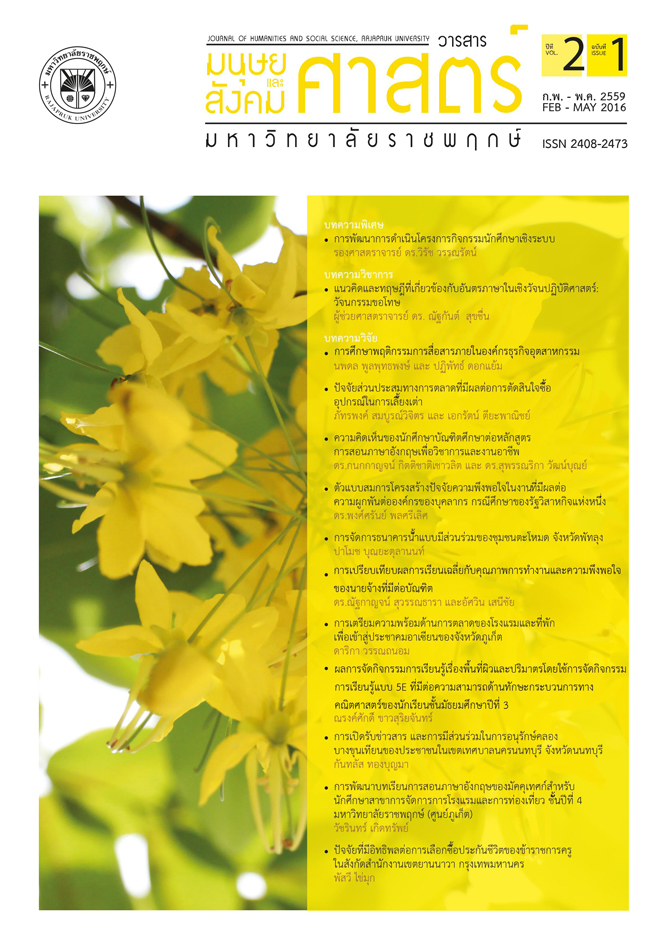Concepts and Theories Relating to Interlanguage Pragmatics: Speech Act of Apologies
Main Article Content
Abstract
Interlanguage pragmatics (ILP) in the field of second language learning and teaching is important for language teachers to investigate learner’s language, both language system and speech acts rules of language use. Additionally, a current model of communicative competence testing requires the knowledge of pragmatics rules. Errors on appropriacy may have more negative effects than grammar. They may characterize the speakers as being rude and offensive. Although, pragmatic competence is believed to be transferred from L1 to L2, Baileystock claims that this learning process is different from both L1 and L2. The learners’ language has its own system and rules. The duration that learners develop new language competence is called ‘interlanguage’. This term was first used by Selinker (1972) to refer to the language that L2 learners construct. Studies in the field of interlanguage indicated that influences from L1 occurred during the development period. This transfer can be either positive or negative on both linguistic and pragmatic competence. Previous research studies indicated that learners’ linguistic and cultural background affected learner’s language use. This causes difficulty when they have to use language in more advanced or more formal patterns. To use the speech acts of apologies appropriately, speakers have to concern ‘face threatening acts’. This relates to several concepts and theories such as Brown and Levinson’s Theory of Politeness. This theory concerns ‘face’ both ‘positive’ and ‘negative’ aspects. Other related theories are Schmidt’s The Noticing Theory and Long’s Explicit Learning.
Article Details
References
Brown, Penelope & Levinson, Stephen C. (1987). Politeness : Some Universals in Language Usage. Cambridge: Cambridge University Press.
Carlson, Richard A. & Dulany, Don E. (1985). “Conscious attention and abstraction in concept learning.” Journal of Experimental Psychology: Learning, Memory, and Cognition, Volume 11: 205-230
Ellis, Rod. (1997). Second Language Acquisition. Oxford: Oxford University Press.
Fisk, Arthur D. & Schneider, Walter. (1984). “Memory as function of attention, level of processing, and automatization.” Journal of Experimental Psychology: Learning, Memory, and Cognition, Volume 10: 181-197.
Gass, Susan & Selinker, Larry. (eds). (2008). Second Language Acquisition: An Introductory Course. New York: Routledge / Taylor and Francis Group.
Goffman, Erving. (1967). Interaction ritual: Essays of face-to-face behavior. Garden City, New York: Anchor Books.
Kasper, Gabriele & Blum-Kulka, Shoshana. (1993). Interlanguage Pragmatics. New York: Oxford University Press.
Kasper, Gabriele & Dahl, Merete. (1991). Research Methods in Interlanguage Pragmatics: Studies in second language Center Technical Reports Series. Hawaii: University of Hawaii.
Kihlstrom, John. (1984). “Concious, subconscious, unconscious: A cognitive perspective. In Kenneth S. Bowers & Donald Meichenbaum (eds.), The unconscious reconsidered. (pp. 149-211). New York: Wiley.
Krashen, Stephen & Terrell, Tracy D. (1982). The Natural approach. London: Longman.
Owen, M. (1983). Apologies and remedial interchange. The Hague: Mouton.
Olshtain, E. (1983). “Sociocultural competence and language transfer: the case of apology.” In S. Gass & L. Selinker (eds.), Language transfer in Language Learning (pp.232-249). Rowley, MA: Newbury House.
Schmidt, Richard W. (1993). “Conciousness, learning, and interlanguage pragmatics.” In G. Kasper and S. Blum-Kulka (eds.), Interlanguage Pragmatics (pp. 21-42), New York: Oxford University Press.
Thomas, Jenny. (1983). Meaning in Interaction. London & New York: Longman Group Limited.
Trosborg, Anna. (1995). Interlanguage Pragmatics: Requests, Complaint and Apologies. Berlin, New York: Mouton de Gruyter.


